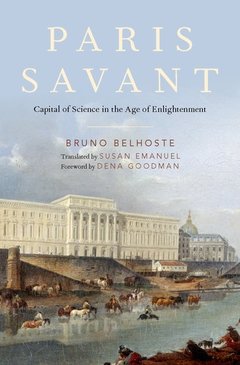Description
Paris Savant
Capital of Science in the Age of Enlightenment
Author: Belhoste Bruno
Language: English
Subject for Paris Savant:
Publication date: 09-2019
328 p. · 16.3x24.3 cm · Hardback
328 p. · 16.3x24.3 cm · Hardback
Description
/li>Biography
/li>
Novelist Honoré de Balzac was the first to use the phrase "Paris savant" to refer to the dynamic Parisian scientific and intellectual community of the late 18th century. The Academy of Sciences was highly active during this time, and was a meeting place for intellectual and scientific elite, who worked together toward the diffusion of scientific knowledge into Parisian society. The Royal Observatory was a headquarters for French astronomy, as well as the great geodesic project to map all of France. The Royal Mint hosted courses in chemistry and mining, and the Arsenal near the Bastille housed the laboratory of Lavoisier, the most celebrated chemist of the age. This book is the English translation of Bruno Belhoste's Paris Savant: Encounters in Enlightenment Science, originally published in France in 2011. Belhoste discusses how the Parisian scientific community came into its important place in the French Enlightenment, focusing on the Academy of Sciences. Chapters cover subjects such as what role Parisian geography played in the movement, the contributions of French scientists to industrial and urban improvement, and how the Academy of Sciences clashed with the revolutionary crisis, resulting in its closing in 1793. The translation includes a prologue for English readers.
Professor Belhoste studied history and history of science at the University Paris 1, obtaining his PhD in 1982 with a dissertation on the life and work of the mathematician Augustin-Louis Cauchy. He obtained his Habilitation in 2001 with a dissertation on the history of the Ecole polytechnique from 1794 to 1870. He was a researcher at the National Institute for Pedagogical in Paris (1986-2003) and a professor in the history of science at the University Paris 10 Nanterre (2003-2007) as well as at the University Paris 1 Panthéon Sorbonne (2007-2018). He was also the head of the Institut d'histoire moderne et contemporaine (CNRS-ENS-Paris 1) (2014-2017), and has been Emeritus Professor since September 2018.
© 2024 LAVOISIER S.A.S.

